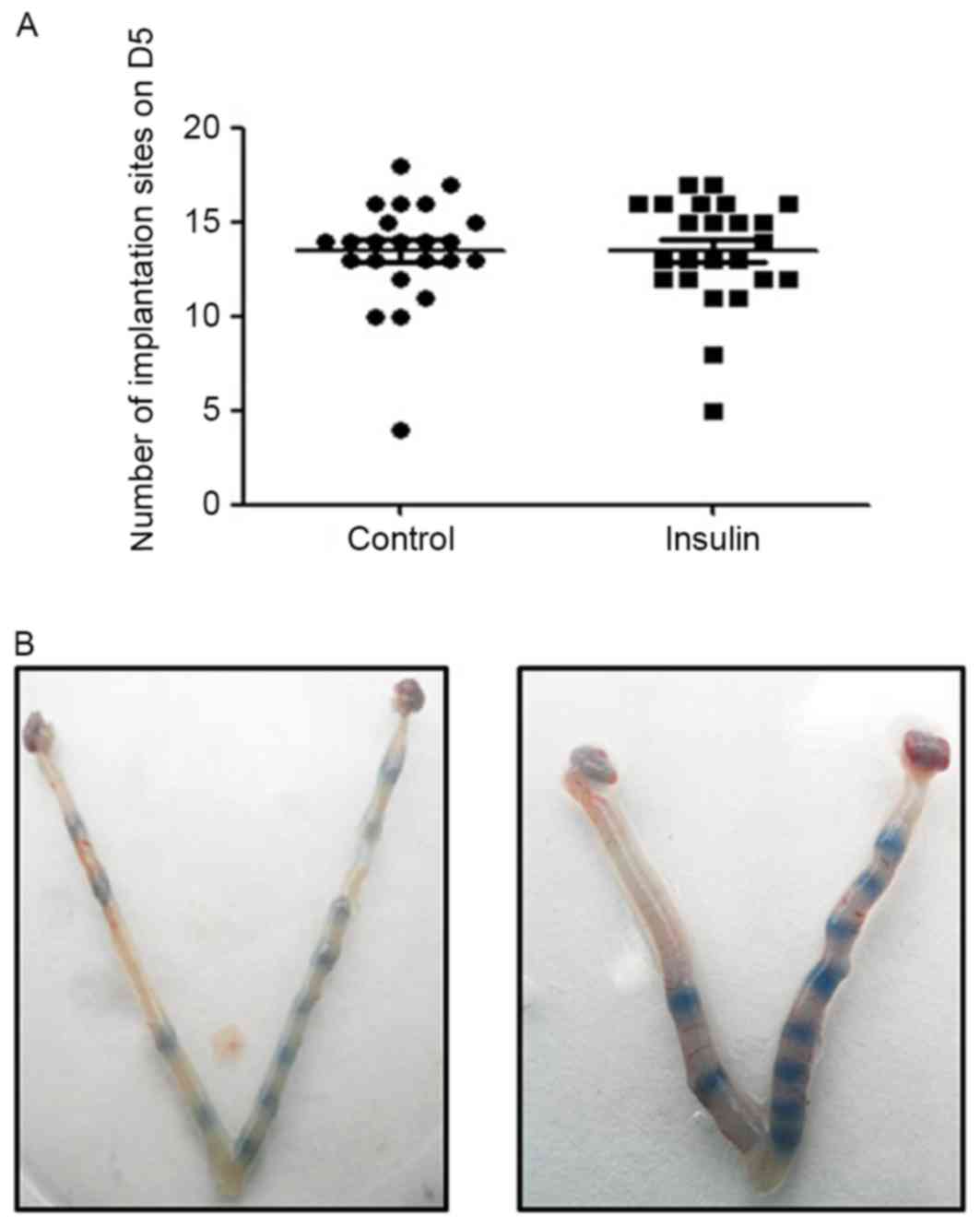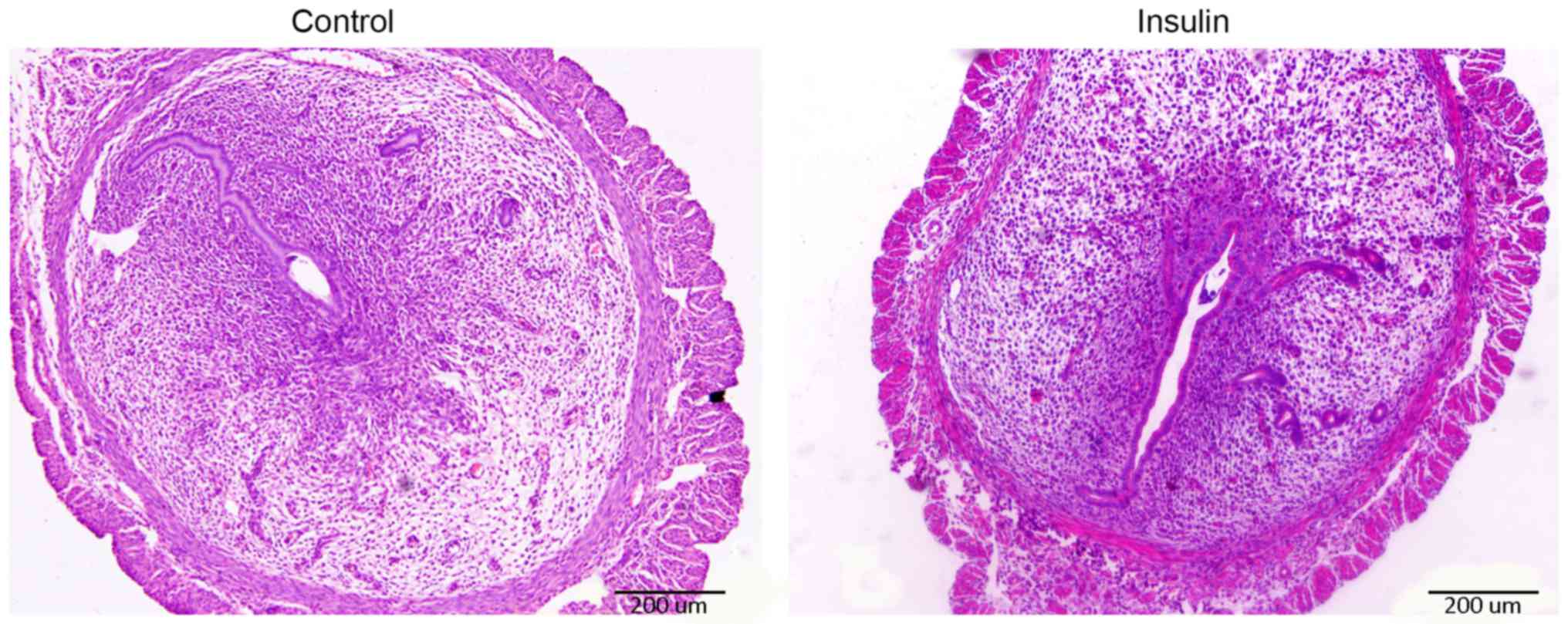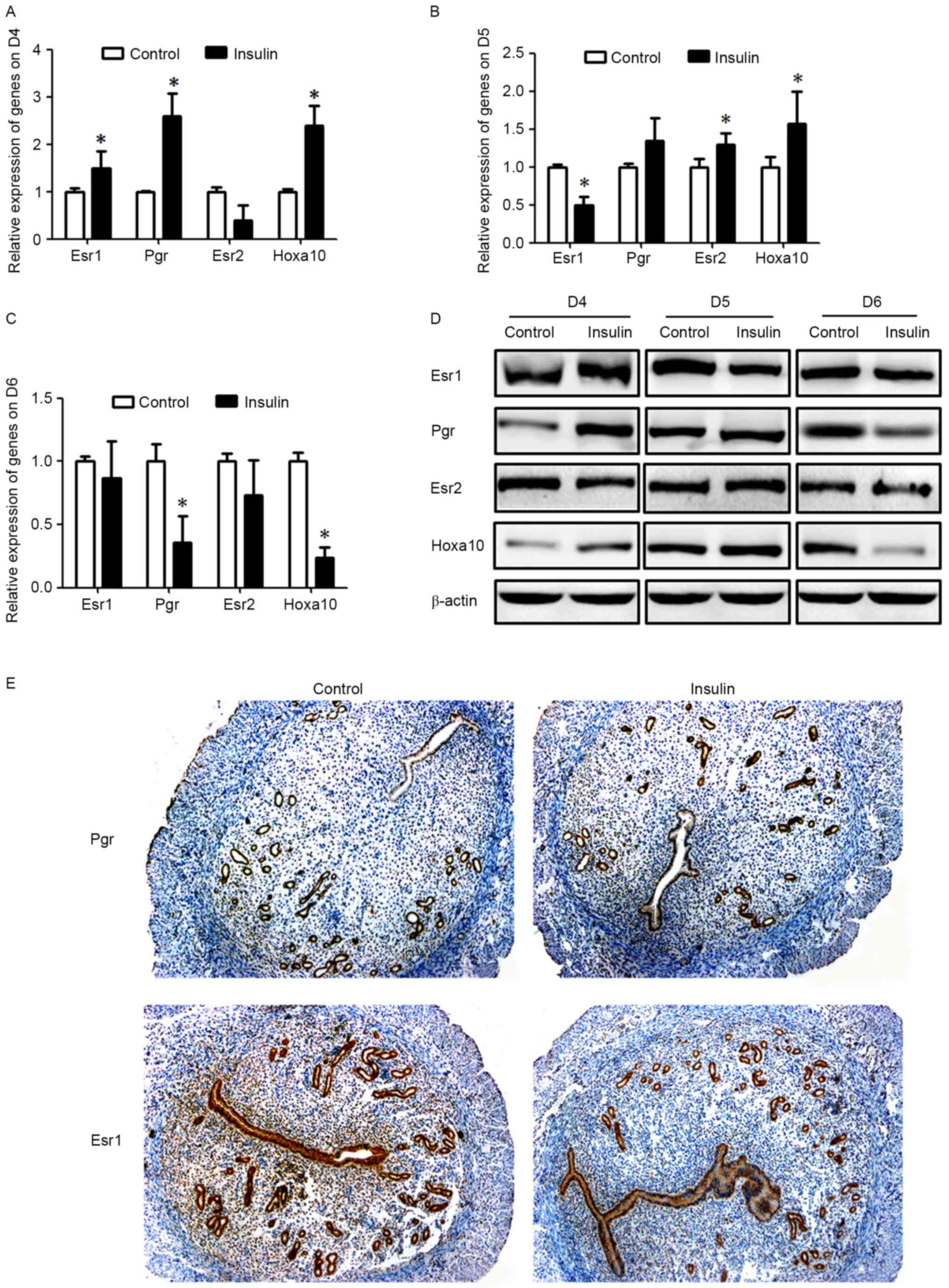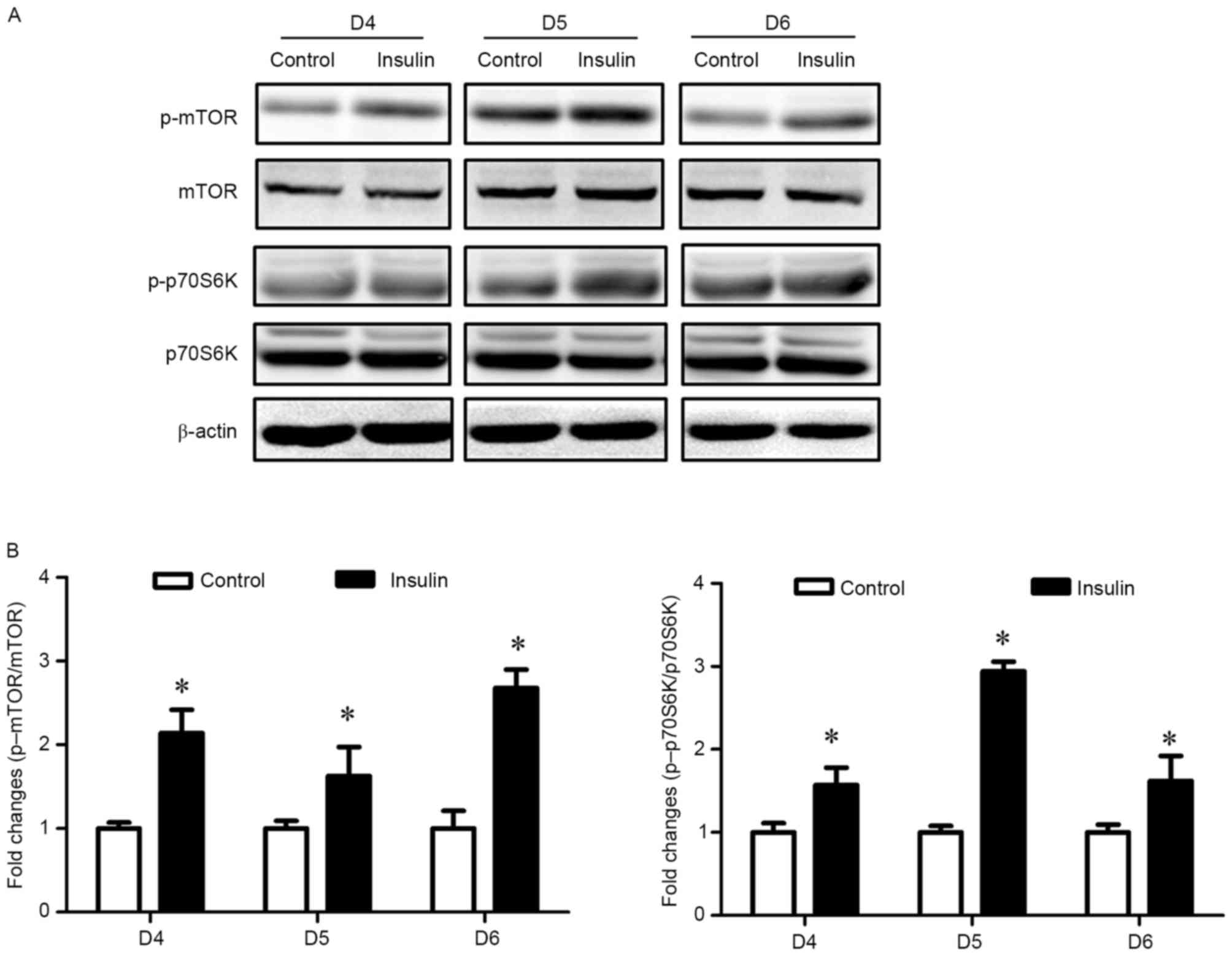|
1
|
Nagashima T, Li Q, Clementi C, Lydon JP,
DeMayo FJ and Matzuk MM: BMPR2 is required for postimplantation
uterine function and pregnancy maintenance. J Clin Invest.
123:2539–2550. 2013. View
Article : Google Scholar : PubMed/NCBI
|
|
2
|
Mori M, Kitazume M, Ose R, Kurokawa J,
Koga K, Osuga Y, Arai S and Miyazaki T: Death effector
domain-containing protein (DEDD) is required for uterine
decidualization during early pregnancy in mice. J Clin Invest.
121:318–327. 2011. View
Article : Google Scholar : PubMed/NCBI
|
|
3
|
Dale PO, Tanbo T, Haug E and Abyholm T:
The impact of insulin resistance on the outcome of ovulation
induction with low-dose follicle stimulating hormone in women with
polycystic ovary syndrome. Hum Reprod. 13:567–570. 1998. View Article : Google Scholar : PubMed/NCBI
|
|
4
|
Svendsen PF, Nilas L, Nørgaard K, Jensen
JE and Madsbad S: Obesity, body composition and metabolic
disturbances in polycystic ovary syndrome. Hum Reprod.
23:2113–2121. 2008. View Article : Google Scholar : PubMed/NCBI
|
|
5
|
Igosheva N, Abramov AY, Poston L, Eckert
JJ, Fleming TP, Duchen MR and McConnell J: Maternal diet-induced
obesity alters mitochondrial activity and redox status in mouse
oocytes and zygotes. PLoS One. 5:e100742010. View Article : Google Scholar : PubMed/NCBI
|
|
6
|
Lintsen AM, Pasker-de Jong PC, de Boer EJ,
Burger CW, Jansen CA, Braat DD and van Leeuwen FE: Effects of
subfertility cause, smoking and body weight on the success rate of
IVF. Hum Reprod. 20:1867–1875. 2005. View Article : Google Scholar : PubMed/NCBI
|
|
7
|
Cano F, García-Velasco JA, Millet A,
Remohí J, Simón C and Pellicer A: Oocyte quality in polycystic
ovaries revisited: Identification of a particular subgroup of
women. J Assist Reprod Genet. 14:254–261. 1997. View Article : Google Scholar : PubMed/NCBI
|
|
8
|
Steiner DF, Park SY, Støy J, Philipson LH
and Bell GI: A brief perspective on insulin production. Diabetes
Obes Metab. 11:(Suppl 4). 189–196. 2009. View Article : Google Scholar : PubMed/NCBI
|
|
9
|
Homburg R: Should patients with polycystic
ovarian syndrome be treated with metformin? A note of cautious
optimism. Hum Reprod. 17:853–856. 2002. View Article : Google Scholar : PubMed/NCBI
|
|
10
|
Kasumov T, Solomon TP, Hwang C, Huang H,
Haus JM, Zhang R and Kirwan JP: Improved insulin sensitivity after
exercise training is linked to reduced plasma C14: 0 ceramide in
obesity and type 2 diabetes. Obesity (Silver Spring). 23:1414–1421.
2015. View Article : Google Scholar : PubMed/NCBI
|
|
11
|
Ou XH, Li S, Wang ZB, Li M, Quan S, Xing
F, Guo L, Chao SB, Chen Z, Liang XW, et al: Maternal insulin
resistance causes oxidative stress and mitochondrial dysfunction in
mouse oocytes. Hum Reprod. 27:2130–2145. 2012. View Article : Google Scholar : PubMed/NCBI
|
|
12
|
Schulte MM, Tsai JH and Moley KH: Obesity
and PCOS: The effect of metabolic derangements on endometrial
receptivity at the time of implantation. Reprod Sci. 22:6–141.
2015. View Article : Google Scholar : PubMed/NCBI
|
|
13
|
Mioni R, Mozzanega B, Granzotto M,
Pierobon A, Zuliani L, Maffei P, Blandamura S, Grassi S, Sicolo N
and Vettor R: Insulin receptor and glucose transporters mRNA
expression throughout the menstrual cycle in human endometrium: A
physiological and cyclical condition of tissue insulin resistance.
Gynecol Endocrinol. 28:1014–1018. 2012. View Article : Google Scholar : PubMed/NCBI
|
|
14
|
Williamson DL, Dungan CM, Mahmoud AM, Mey
JT, Blackburn BK and Haus JM: Aberrant REDD1-mTORC1 responses to
insulin in skeletal muscle from Type 2 diabetics. Am J Physiol
Regul Integr Comp Physiol. 309:R855–R863. 2015. View Article : Google Scholar : PubMed/NCBI
|
|
15
|
Caron A, Richard D and Laplante M: The
Roles of mTOR complexes in lipid metabolism. Annu Rev Nutr.
35:321–348. 2015. View Article : Google Scholar : PubMed/NCBI
|
|
16
|
Sharawy MH, El-Awady MS, Megahed N and
Gameil NM: Attenuation of insulin resistance in rats by agmatine:
Role of SREBP-1c, mTOR and GLUT-2. Naunyn Schmiedebergs Arch
Pharmacol. 389:45–56. 2016. View Article : Google Scholar : PubMed/NCBI
|
|
17
|
Xiao F, Yu J, Guo Y, Deng J, Li K, Du Y,
Chen S, Zhu J, Sheng H and Guo F: Effects of individual
branched-chain amino acids deprivation on insulin sensitivity and
glucose metabolism in mice. Metabolism. 63:841–850. 2014.
View Article : Google Scholar : PubMed/NCBI
|
|
18
|
Chen X, He J, Ding Y, Zeng L, Gao R, Cheng
S, Liu X and Wang Y: The role of MTOR in mouse uterus during embryo
implantation. Reproduction. 138:351–356. 2009. View Article : Google Scholar : PubMed/NCBI
|
|
19
|
Wang A, Ji L, Shang W, Li M, Chen L, White
RE and Han G: Expression of GPR30, ERα and ERβ in endometrium
during window of implantation in patients with polycystic ovary
syndrome: A pilot study. Gynecol Endocrinol. 27:251–255. 2011.
View Article : Google Scholar : PubMed/NCBI
|
|
20
|
Poretsky L, Clemons J and Bogovich K:
Hyperinsulinemia and human chorionic gonadotropin synergistically
promote the growth of ovarian follicular cysts in rats. Metabolism.
41:903–910. 1992. View Article : Google Scholar : PubMed/NCBI
|
|
21
|
Lima MH, Souza LC, Caperuto LC, Bevilacqua
E, Gasparetti AL, Zanuto R, Saad MJ and Carvalho CR: Up-regulation
of the phosphatidylinositol 3-kinase/protein kinase B pathway in
the ovary of rats by chronic treatment with hCG and insulin. J
Endocrinol. 190:451–459. 2006. View Article : Google Scholar : PubMed/NCBI
|
|
22
|
Paria BC, Huet-Hudson YM and Dey SK:
Blastocyst's state of activity determines the ‘window’ of
implantation in the receptive mouse uterus. Proc Natl Acad Sci USA.
90:10159–10162. 1993. View Article : Google Scholar : PubMed/NCBI
|
|
23
|
Tan Y, Tan D, He M, Gu M, Wang Z, Zeng G
and Duan E: A model for implantation: Coculture of blastocysts and
uterine endometrium in mice. Biol Reprod. 72:556–561. 2005.
View Article : Google Scholar : PubMed/NCBI
|
|
24
|
Livak KJ and Schmittgen TD: Analysis of
relative gene expression data using real-time quantitative PCR and
the 2(−Delta Delta C(T)) method. Methods. 25:402–408. 2001.
View Article : Google Scholar : PubMed/NCBI
|
|
25
|
Zorn TM, Soto-Suazo M, Pellegrini CR,
Oliveira JG and Stumpf WE: Estradiol receptor binding to the
epithelium of uterine lumen and glands: Region- and time-related
changes during preimplantation and periimplantation periods studied
by autoradiography. Histochem Cell Biol. 120:1–12. 2003. View Article : Google Scholar : PubMed/NCBI
|
|
26
|
Liu G, Zhang X, Lin H, Wang H, Li Q, Ni J
and Zhu C: Effects of E-cadherin on mouse embryo implantation and
expression of matrix metalloproteinase-2 and −9. Biochem Biophys
Res Commun. 343:832–838. 2006. View Article : Google Scholar : PubMed/NCBI
|
|
27
|
Chan SY: Effects of prostaglandin E2 and
F2 alpha on peri-implantation development of mouse embryos in
vitro. Prostaglandins. 42:321–336. 1991. View Article : Google Scholar : PubMed/NCBI
|
|
28
|
Palaniappan M, Menon B and Menon KM:
Stimulatory effect of insulin on theca-interstitial cell
proliferation and cell cycle regulatory proteins through MTORC1
dependent pathway. Mol Cell Endocrinol. 366:81–89. 2013. View Article : Google Scholar : PubMed/NCBI
|
|
29
|
Li Z, Miard S, Laplante M, Sonenberg N and
Picard F: Insulin stimulates IGFBP-2 expression in 3T3-L1
adipocytes through the PI3K/mTOR pathway. Mol Cell Endocrinol.
358:63–68. 2012. View Article : Google Scholar : PubMed/NCBI
|
|
30
|
Catalano PM and Shankar K: Obesity and
pregnancy: Mechanisms of short term and long term adverse
consequences for mother and child. BMJ. 356:j12017. View Article : Google Scholar : PubMed/NCBI
|
|
31
|
Moran L and Teede H: Metabolic features of
the reproductive phenotypes of polycystic ovary syndrome. Hum
Reprod Update. 15:477–488. 2009. View Article : Google Scholar : PubMed/NCBI
|
|
32
|
Diamanti-Kandarakis E and Dunaif A:
Insulin resistance and the polycystic ovary syndrome revisited: An
update on mechanisms and implications. Endocr Rev. 33:981–1030.
2012. View Article : Google Scholar : PubMed/NCBI
|
|
33
|
Templeman NM, Skovsø S, Page MM, Lim GE
and Johnson JD: A causal role for hyperinsulinemia in obesity. J
Endocrinol. 232:R173–R183. 2017. View Article : Google Scholar : PubMed/NCBI
|
|
34
|
Wang H and Dey SK: Roadmap to embryo
implantation: Clues from mouse models. Nat Rev Genet. 7:185–199.
2006. View
Article : Google Scholar : PubMed/NCBI
|
|
35
|
Quenby S, Anim-Somuah M, Kalumbi C,
Farquharson R and Aplin JD: Different types of recurrent
miscarriage are associated with varying patterns of adhesion
molecule expression in endometrium. Reprod Biomed Online.
14:224–234. 2007. View Article : Google Scholar : PubMed/NCBI
|
|
36
|
Sabatini DM: mTOR and cancer: Insights
into a complex relationship. Nat Rev Cancer. 6:729–734. 2006.
View Article : Google Scholar : PubMed/NCBI
|
|
37
|
Vahidnezhad H, Youssefian L and Uitto J:
Molecular genetics of the PI3K-AKT-mTOR pathway in genodermatoses:
Diagnostic implications and treatment opportunities. J Invest
Dermatol. 136:15–23. 2016. View Article : Google Scholar : PubMed/NCBI
|
|
38
|
Wataya-Kaneda M: Mammalian target of
rapamycin and tuberous sclerosis complex. J Dermatol Sci.
79:93–100. 2015. View Article : Google Scholar : PubMed/NCBI
|
|
39
|
Somers MJ and Paul E: Safety
considerations of mammalian target of rapamycin inhibitors in
tuberous sclerosis complex and renal transplantation. J Clin
Pharmacol. 55:368–376. 2015. View Article : Google Scholar : PubMed/NCBI
|
|
40
|
Huo F, Zhang C, He H and Wang Y:
MicroRNA-144-3p inhibits proliferation and induces apoptosis of
human salivary adenoid carcinoma cells via targeting of mTOR.
Biotechnol Lett. 38:409–416. 2016. View Article : Google Scholar : PubMed/NCBI
|
|
41
|
Neil J, Shannon C, Mohan A, Laurent D,
Murali R and Jhanwar-Uniyal M: ATP-site binding inhibitor
effectively targets mTORC1 and mTORC2 complexes in glioblastoma.
Int J Oncol. 48:1045–1052. 2016.PubMed/NCBI
|
|
42
|
Fritzen AM, Madsen AB, Kleinert M, Treebak
JT, Lundsgaard AM, Jensen TE, Richter EA, Wojtaszewski J, Kiens B
and Frøsig C: Regulation of autophagy in human skeletal muscle:
Effects of exercise, exercise training and insulin stimulation. J
Physiol. 594:745–761. 2016. View Article : Google Scholar : PubMed/NCBI
|
|
43
|
Martin PM and Sutherland AE: Exogenous
amino acids regulate trophectoderm differentiation in the mouse
blastocyst through an mTOR-dependent pathway. Dev Biol.
240:182–193. 2001. View Article : Google Scholar : PubMed/NCBI
|
|
44
|
Gangloff YG, Mueller M, Dann SG, Svoboda
P, Sticker M, Spetz JF, Um SH, Brown EJ, Cereghini S, Thomas G and
Kozma SC: Disruption of the mouse mTOR gene leads to early
postimplantation lethality and prohibits embryonic stem cell
development. Mol Cell Biol. 24:9508–9516. 2004. View Article : Google Scholar : PubMed/NCBI
|
|
45
|
Kim J, Song G, Wu G, Gao H, Johnson GA and
Bazer FW: Arginine, leucine, and glutamine stimulate proliferation
of porcine trophectoderm cells through the MTOR-RPS6K-RPS6-EIF4EBP1
signal transduction pathway. Biol Reprod. 88:1132013. View Article : Google Scholar : PubMed/NCBI
|
|
46
|
Wollenhaupt K, Brüssow KP, Albrecht D and
Tomek W: The Akt/mTor signaling cascade is modified during
placentation in the porcine uterine tissue. Reprod Biol.
13:184–194. 2013. View Article : Google Scholar : PubMed/NCBI
|
|
47
|
Mahdi H, Xiu J, Reddy SK and DeBernardo R:
Alteration in PI3K/mTOR, MAPK pathways and Her2
expression/amplification is more frequent in uterine serous
carcinoma than ovarian serous carcinoma. J Surg Oncol. 112:188–194.
2015. View Article : Google Scholar : PubMed/NCBI
|
|
48
|
Guntas G, Hallett RA, Zimmerman SP,
Williams T, Yumerefendi H, Bear JE and Kuhlman B: Engineering an
improved light-induced dimer (iLID) for controlling the
localization and activity of signaling proteins. Proc Natl Acad Sci
USA. 112:112–117. 2015. View Article : Google Scholar : PubMed/NCBI
|


















